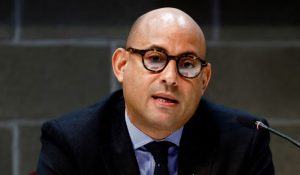
Holding Officials Accountable for Their Actions
Roughly a month after fuel queues surfaced across the country, we are still not fully back to normal although the situation is much better. As often as the case in Nigeria, the root cause of the harrowing experience that caused untold hardship to millions is still shrouded in mystery. While the Nigerian National Petroleum Company Limited (NNPC Ltd.) blamed the development on ‘logistics issues’, however, this was refuted by the Petroleum Products Retail Outlets Owners Association of Nigeria (PETROAN), who said they were not being supplied enough of the product to dispense to customers. Speaking on April 26 at the height of the problem, the Chief Corporate Communications Officer, NNPC Ltd, Olufemi Soneye said: “The NNPC Ltd wishes to clarify that the tightness in the supply of Premium Motor Spirit currently being experienced in some areas across the country is a result of logistics issues and that they have been resolved.
“It also wishes to reiterate that the prices of petroleum products are not changing. It urges Nigerians to avoid panic buying as products are sufficient in the country.” But three days later PETROAN gave a different explanation through its National President, Billy Gillis-Harry.
Speaking on a private Lagos-based TV station, he said: “NNPC has its outlets that they also serve. So if they have some logistics issues, that might be what is internal to NNPC. But as for us, PETROAN members, we can tell Nigerians for real that if we have petroleum products delivered to us, supplied to us upon payment for those same products, we will supply them to Nigerians.
“We do not have any reason not to serve the public and we are willing to serve the public. All that is required is for us to have petroleum products delivered to us from NNPC and we will make sure that our retail outlets are open, some are even open for 24 hours.” Even the Independent Petroleum Marketers Association of Nigeria (IPMAN) weighed in, insisting that they too had been starved of the product, which was why Nigerians were put through the wringer trying to get fuel.
However, while the claims and counterclaims lasted, Nigerians were going through hell trying to lay their hands on the essential commodity with the price reportedly shooting to as high as N2000 per litre in some parts of the country. Sadly, despite being the world’s 14th largest oil producer, reoccurring fuel scarcity has become the norm in Nigeria with hardly any administration immune from the embarrassing anomaly.
Incidentally, at the height of the shortage, social media became awash with reports of previous scarcities, one of which was the New Nigerian of Monday, March 24, 1975, with the banner headline: ‘Petrol scarcity still acute’! That was almost 50 years ago, and as I said earlier, despite having had 14 administrations (both military and civilian) since then, we are still not out of the woods when it comes to fuel scarcity, because the so-called ‘Giant of Africa’ has been unable to find a permanent solution to the embarrassing problem. It is only logical that as an oil-producing nation, we should have our refineries to help meet our domestic consumption and by extension not need to spend our scarce foreign exchange on importation, but due to the proverbial ‘Nigerian factor’ all four plants (Port Harcourt 1&2, Warri and Kaduna), were allowed to run down. Despite promises to fix them and the huge capital outlay splashed on them, they are still not functioning and no one has been held accountable. Herein lies the nation’s biggest problem –officials are hardly ever held accountable for their actions or inactions even when such adversely affects not only millions of Nigerians but the economic well-being of the nation! In the earlier hours of October 7 last year, the world awoke to learn that Hamas fighters had launched an audacious attack on Israel which lasted hours and left more than 1200 people, including 300 soldiers dead, and more than 250 abducted. This happened right under the noses of the famed Israeli intelligence services including Aman (military intelligence) Shin Bet (internal security) and the Mossad, which is responsible for intelligence collection, covert operations, and counter-terrorism.
Last month, the Israeli army announced the departure of Major-General Aharon Haliva, the head of Israel’s military intelligence, because his department failed to anticipate the attack. In resigning the general said: “The military intelligence directorate under my command did not live up to our mission.” Haliva said he has “been carrying that black day ever since, day and night.
I will live with the horrible pain of the war every day.” Haliva is the highest-ranking leader to resign over the assault, the deadliest one day attack in Israel’s history. Military leaders in March launched a preliminary review of the army’s performance on Oct. 7, which left some towns fighting on their own for hours. And experts say they expect there eventually to be a formal, independent investigation of all aspects of the crisis along the lines of the 9/11 Commission in the United States after the Sept. 11, 2001, terrorist attacks.
But those efforts have been largely deferred as Israel continues to fight Hamas in Gaza and fend off missile attacks from Hezbollah fighters in Lebanon.
Experts expect more resignations, including that of Prime Minister, Benjamin Netanyahu, to follow as soon as the problem with Hamas is sorted out. Unfortunately, despite clear cases of failures on the part of those charged with piloting the affairs of the nation, hardly any of them are ever made to account for their failings. In a report widely published last month in various newspapers, it was said that since November 2013 when the Federal Government privatised the power sector, to improve its efficiency, the National Grid has collapsed more than 140 times! The current demolition exercise in Lagos, which sadly has assumed an ethnic colouration, can be traced to the antics of unscrupulous officials who approved building permits for the affected proper- ties.
On November 1, 2021, a high-rise block of luxury flats under construction on Gerard Road, Ikoyi, Lagos, collapsed killing at least 42 people. A Coroner’s Inquest into the incident blamed the collapse on negligence by agencies responsible for approval and supervision of the building project.
The Coroner, O.A. Komolafe, a chief magistrate, held that the building’s density and setback on the site showed a gross violation of the Lagos State Building Regulations. Regrettably, to date, I’m not aware that anyone has been held accountable for the disaster. Sadly, until we ensure that those in charge of running the affairs of the country are held accountable we will continue to face such nightmarish situations like fuel scarcity, grid collapses, insecurity and the like!
credit: New Telegraph









